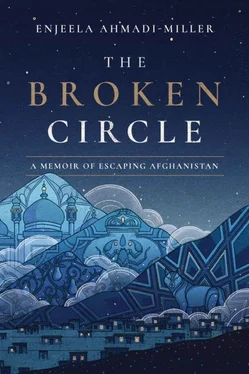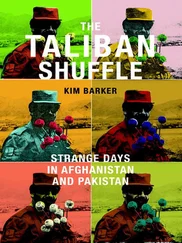They must have faced being arrested and tortured like so many others who defied the new government. Now my cousins were gone, and with them, the days of freedom and hope for the future of my country. This freedom that Zia described must be a great thing if people so willingly sealed it with their own blood.
Mommy was different after that call. The sadness over the death of her cousins never seemed to lift from her mind. It was during this time of grieving that she began to tell us stories from the Quran.
The one she spent the most time on was the story of Moses. After school, she would gather us around in the family room, all the kids except Shapairi and Ahmad Shah. Only later did I understand why she gathered the four of us and not my older siblings.
“A woman in Egypt had a little baby. But Pharaoh had made a new law that the firstborn of every slave family had to die. The woman couldn’t let her child die, so she made a basket for him. She set the basket adrift in a river to float along. Perhaps someone kind would find him and take care of him. It was the Pharaoh’s daughter who found the basket and took the boy and raised him as her own.” Mommy’s voice grew sad. “She had to let him go. She didn’t have any choice.”
She repeated the story many times to us, always speaking with a deep passion about how sad the boy’s mommy must have been to let him go like that. But she knew her son would grow up strong because God would take care of him. Still “it was sad, very sad,” she would say.
I had to agree with her. It was a tragedy indeed for a mommy to lose a child, to be forced by calamity and fear to let him float away with a chance he would have a safe and happy life. As much as I believed the Quran, to me, it was only a story. I had no notion that mommies actually did such things.
What if there was a hole in the basket? What if the baby tipped over and fell into the water?
A few weeks later, Mommy left the house and didn’t return. She told Noor she was living at her brother’s house, my favorite uncle, until Padar stopped drinking. She had packed her suitcase and left in the night. The evening before, she and Padar had spent a long time talking in their room. I never heard any arguing, maybe because their room was far away from mine. From her comments around the house, I knew that she was unhappy because of Padar’s drinking, which had escalated since her cousins’ deaths.
The next night at dinner, the table was much quieter without Shahnaz, and now Mommy. I wanted to ask Padar when she would come home. My sisters and brothers were so serious and subdued, I was scared to break the silence. But I finally got up the nerve to ask him.
Padar ate his rice and kofta, Afghan meatballs, deep in thought as if he were trying to solve a complex mathematical problem. He mindlessly sipped his Scotch, not caring to address my question. Shapairi decided to change the subject. She brought up the fighting in the streets in the provinces, young men getting arrested for avoiding service in the army, and protest marches at the university.
We had all listened to the TV before dinner, and it varied drastically from the things Shapairi had been hearing at school. The government’s version of the news included parades and ceremonies announcing new medical and educational programs. There existed two completely different Afghanistans. The official version was that of a progressive country marching forward into a bright future as a modern nation. My sisters told me of another Afghanistan, of fighting to force the government to stop changing the textbooks in the schools to ones that teach atheism and socialism.
Students, particularly from the university and high schools, were staging protests in the city streets, and police were making arrests. Padar began warning us not to go too far away from the house—“To school and back,” he said.
“We’re students,” Laila said. “Shouldn’t we be protesting with everyone else?”
“Stay out of the streets,” he’d tell us sharply.
He looked around the dinner table at us all. “You don’t know what’s going on. If you’re not in school, you should just stay close to the house.” He insisted we play only behind the gates. No more soccer games in the neighborhood streets. He knew what was going on, but he was strangely quiet on the matter, as though if he didn’t talk about it, it might go away. As we ate the rest of our dinner in silence, the country outside our gates was in full-scale revolt against the government.
The next afternoon, I climbed the pear tree by the front gate and waited for my sisters and Zia to return from school. I could see all the way down to the end of the street, and soon neighbor kids with their books and in their school uniforms turned the corner and moved toward me in groups, talking and joking.
Since Mommy wasn’t around to make sure we had our homework finished, we fell right into playing volleyball or kickball or a soccer game as soon as my sisters and brothers got home from school. Sometimes I chased neighbor kids on the walls or climbed trees in the orchard and picked fruit, and we ate them or threw them at each other. Playing is a child’s form of work, a way of dispensing with the harshness of what existed outside the walls of our home, a place where our lawns were mowed every week, trees tended to, and Mommy’s rose garden was weeded and trimmed so the bushes were full and beautiful and fragrant.
When we heard the muezzin’s call to prayer, we knew it was five o’clock, and dinner would be on the table soon. Padar would be expecting all of us with our hands and faces washed and sitting in our places ready to eat. This dinner was the same somber episode; a dark cloud had come over him that was becoming unbearable to live with. Dinnertime brought fresh reports of what Ahmad Shah and Shapairi had seen at school. Padar said only that he didn’t think it would get much better.
After dinner, I asked Laila and Zulaikha about Mommy.
“Why isn’t she coming home?” I asked. They just shrugged. There wasn’t anything they could do about it.
Why were they so nonchalant about Mommy being away? Zulaikha was always like that, withdrawn and shy, never wanting to disturb anyone. Laila was busy with her own life—school and volleyball. I missed Mommy something terrible. I spent all day with my baby sister, Vida, waiting and watching for Mommy to come home. If no one did anything, I would have to.
The next day, after my sisters were off to school and Padar drove out of the gates to the embassy, I set out by myself. I had put on a new blue dress Mommy had sewn for me. I wore my black shoes and brushed my hair. I left when Noor was busy in the kitchen, and the maids were busy cleaning or watching Vida. I skipped down Shura Street away from my house before anyone noticed I was gone. I began kicking a soda can down the street. I turned onto busy Pul-e-Surkh Road, a traffic-choked four-lane arterial that ran north and south through the heart of the city.
Six scruffy-looking boys, who were going door-to-door begging, surrounded me, teasing me about my blue dress, lifting my skirt. Their behavior shocked me at first, and I thought of running home. But if I ran home, I would never reach Mother. Besides, these boys weren’t any bigger than my brothers and their friends. And I wasn’t afraid of them. I pushed my skirt down and yelled at them, “I never wear a dress. If I had my jeans on, I’d kick your butt. I have an older sister and older brother I fight with all the time.”
I balled up my fists, ready to swing. They backed off, and just then a gate opened and a car backed out into the street. The biggest one said they should go, and they strolled away in the other direction.
Читать дальше













